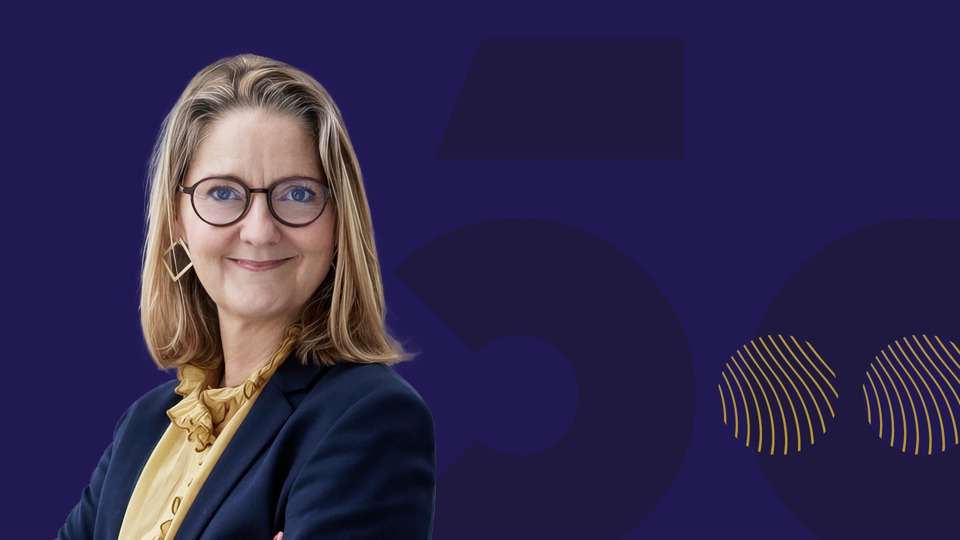By Lea Laursen Pasgaard, AAU Communication and Public Affairs
Foto: Stine Heilmann. Grafik: Søren Emil Søe Degn
Couldn’t doing a PhD be something for you? Lone Kørnøv was asked this question several times by her teachers when she was studying engineering at AAU in the nineties. At first, she said no. She would rather use her education outside the walls of the university. But her deep passion for the subject grew, and her teachers' insistence continued.
"One year I was hired as a teaching and research assistant, and then I finally ended up accepting. So it was very much the encouragement of some of those who later became my colleagues and their faith in me that did it. Combined with the fact that I quickly became very committed to the subject itself," says Lone Kørnøv, who is a professor of environmental assessment in the Department of Sustainability and Planning and head of the Danish Centre for Environmental Assessment at AAU.
It is now 35 years since Lone Kørnøv began her studies at AAU. Thus, she has been part of the university for more than half of its lifetime. This year, AAU celebrates its 50th anniversary, and AAU Update has interviewed a number of staff members about their relationship with the university – and wishes for AAU’s future. One of these staff members is Lone Kørnøv, and she says that it was the group work that made her apply to AAU.
"It's been many years now, but I think it's always been a part of me that I believe very much in the community's ability to make a difference. Far more than the individual's. And that's still how I function, how I work, and how I live my life. I wonder if that was also what it was back then – in some youthful sense," Lone Kørnøv remembers.
The professor is – in her own words – one of those strange people who really loves their job. She has received several attractive job offers over the years, and she has also worked outside the university at various times. Nevertheless, she has remained at AAU.
"For me, there is a pretty deep sense of meaningfulness, attachment and responsibility. AAU is not just a workplace for me. It is also a place where, after 30 years, I have invested an incredible number of hours and a significant amount of energy – both personally and professionally," says Lone Kørnøv.
Over the years, she has helped to create and influence new research environments, educated countless students and created networks and relationships, which means that in her experience there is a lot she can do as a researcher.
Lone Kørnøv herself says that she knows that we live in a time and in a sector where mobility is celebrated, but for her, the continuity and the fact that she has chosen to stay at AAU has been an enormous gift. Among other things, in terms of influence.
Bridging the gap between theory and practice
Lone Kørnøv believes that she has had an amazing and unique opportunity to be able to build bridges between theory and practice – between research and society.
"For me, it has been one of the most satisfying parts of my work – being able to bring research results out into the world where they have been able to make a real difference. It's an amazing feeling that my work and that of my colleagues has a concrete impact and helps to create positive change," she says.
She probably could have created results and positive changes in other workplaces, other universities. But Lone Kørnøv contends that AAU's problem-based approach and close contact with the surrounding community have given her particular prerequisites for building bridges between academia and society.
"The close contact with the surrounding community is part of the university's DNA, and that, I think, is a really positive aspect in making a difference," she explains.
Knowledge obliges
AAU's mission to create knowledge for the world and thus make a concrete, positive difference in the world is one of the things Lone Kørnøv appreciates most about her workplace. Therefore, she also warmly welcomes the fact that AAU has introduced a new research indicator where impact and sustainability are integrated parameters on which research is measured.
"This shows that it’s not only about creating new knowledge, but also about ensuring that the new knowledge makes a real, positive difference for society and the generations that follow. As researchers and universities, we acquire new knowledge and create new insights through research that benefits society. Not just as a personal achievement or intellectual triumph. We must strive for both excellence and relevance," states Lone Kørnøv.
She believes that the research landscape around AAU has changed a lot over the years. While Lone Kørnøv is pleased that there is increased focus on research impacting society, she is more concerned about the consequences of the fierce competition that characterizes academia. Individuality is cultivated, and joint effort has taken a back seat, she believes.
